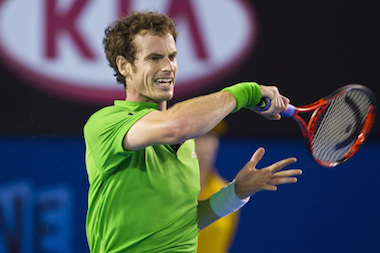Andy Murray: Five Mental Strategies to look out for at Wimbledon

The Scot once again carries the hopes of a nation on his shoulders for (hopefully) the next fortnight and will be under extreme levels of psychological pressure when he graces the hallowed tennis courts of SW19
Jermaine Haughton
Sportspeople and business leaders are often compared for the pressure cooker environment in which they ply their trade. Having overcome Novak Djokovic two years ago to become the first British man to win the Wimbledon singles title since Fred Perry in 1936, Andy Murray will have a number of coping strategies that will appeal to chief executives, looking to achieve similar levels of success.
1. Calm press interviews
Eager to avoid the battle with media he experienced last year following the appointment of Amélie Mauresmo, don’t be surprised if Murray repeats predictable clichés over the next two weeks to evade any controversy or mental distraction. Previously criticised for his bland personality, he will be concentrating on remaining calm and focused on producing his best performances on the centre court grass, rather than in front of the mic. Therefore, instead of answering questions about how the hiring of a female coach has not adversely affected his serve and volley, listen out for plenty of “It was a tough match, and I gave it 100%” interviews to keep a lid on the pressure.
2. Relaxation techniques
Unbeknown to many bosses, the 2012 US Open winner’s relaxation techniques can provide a fruitful method of unwinding from the high pressure and intensity of the workplace. Previously a major advocate for Bikram yoga and its beneficial qualities on his stamina, flexibility and core strength, Murray has been working with a collection of Pilates and Gyrotonic instructors in preparation for Wimbledon. Having had back surgery in 2013, the techniques are ideal for minimising the pressure on his body, while providing a fun and challenging alternative to traditional high-intense training methods. Murray said his workouts have done more than help his back. “The rest of my body feels much better,” he said.
3. Thought control strategies
SUnder the tutorship of Mauresmo, Murray has managed to transition from a highly effective and efficient tennis player into a more confident and adventurous performer through positive thinking. In addition to self-talk practices and goal setting, the 2012 Olympic champion says his coach’s interpersonal skills have made it easier for him to prepare mentally for competition. Speaking last June, he said: “It’s great having Amélie around, she’s a very calm person but also incredibly supportive, so naturally that helps me. She’s also a great listener and, if I have any concerns, she’ll listen to them and then we’ll work through them in practice.”
4. New mentorship
With coach Amélie Mauresmo due to give birth to her first child in August, Murray will rely more heavily on another member of his team, three-time Wimbledon doubles champion Jonas Bjorkman. However, Mauresmo will also be at Wimbledon. How can Andy deal with having two such influences at once? In April, Murray said: “It’s a big process preparing for the major events. So it will be all about how she feels and then timing, and whether it can work out. But no one knows what that’s going to be. Amélie will be the only one that knows and I don’t think right now she knows, because it’s obviously a pretty life-changing thing when you have a child. We’ll see what happens.”
5. Wimbledon Crowd - Help or Hindrance?
Murray doesn’t have the luxury of sharing the burden of expectation with any compatriots, as was the case with his predecessors, Tim Henman and Greg Rusedski. Some 17.3 million British viewers watched as Murray won the title in 2013 and, as he strives to repeat the feat, the British Association of Tennis Supporters have insisted Glaswegian will have the full support of the Wimbledon crowd this year.
But Murray admits the fervent fan support adds a new dimension to his game. “So long as when I get on the court everyone is behind me and I get the support going from the beginning of the matches, that is all I can really ask for,” said Murray. “It’s my job to deal with everything else that goes on around Wimbledon, but if the crowd is behind me in the matches it definitely helps me raise my game.”
Image courtesy of FlashStudio / Shutterstock.com

Press & Media Enquiries
For more information or to request interviews, contact CMI's Press Team on 020 7421 2705 or email press.office@managers.org.uk


